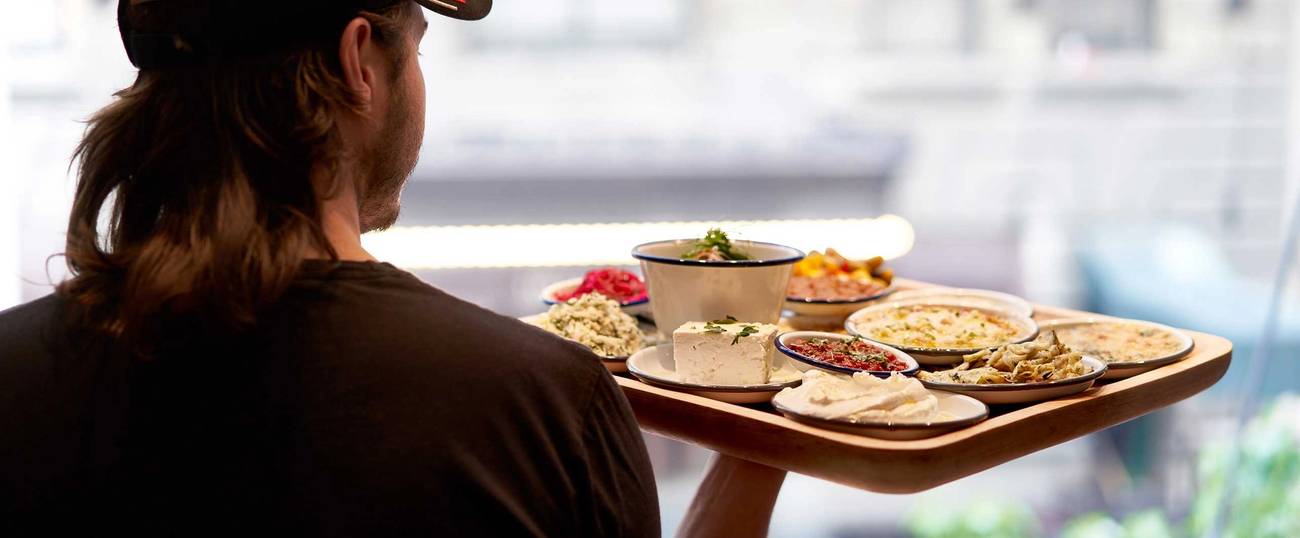Coming to a Hotel Near You: Israeli Cuisine
New restaurants across the U.S. and Europe bring Middle Eastern menus to travelers and locals alike




Hotel restaurants have increasingly forgotten their mediocre past, reinventing themselves as a trendy home of some of the best food in town. How does the cool, new hotel restaurant please both home-based customers and diners from all over the globe? Often, with Israeli food.
While the worldwide explosion of Israeli and Mediterranean cuisine can be traced to pioneers like Michael Solomonov and Yotam Ottolenghi, this is the next wave: challah, schnitzel, and harissa as a common denominator for travelers and local dwellers alike.
On a recent visit to Europe, hotel restaurants’ Israeli connection couldn’t have been more evident. In Vienna’s Max Brown hotel, I feasted at Seven North, a vibrant restaurant operated by Israeli superstar chef Eyal Shani. The table was covered with brown waxed paper, Shani’s favorite casual trick. On it, burnt cabbage with sour cream, roasted cauliflower, “3D Roast Beef” (thin slices of artfully laid roast beef, garnished with horseradish), and messy beetroot carpaccio mingled, creating a deeply Tel Avivian meal. These are dishes familiar to anyone who frequents Shani’s restaurants in Israel; the ingredients are similar, and the deliberately messy and creative presentation echoes the style of Romano, his restaurant-meets-nightclub in the center of Tel Aviv.
Max Brown’s is operated by an Israeli entrepreneur, which helps explain Seven North. “My favorite restaurant in Tel Aviv is North Abraxas,” said Liran Wizman—the owner of Europe Hotels Private Collection, the hotel group behind the Max Brown chain—referring to Shani’s perpetually booked restaurant. Born in Israel, Wizman is currently based in Amsterdam. “When the topic of creating a new restaurant came up, the fit felt perfect,” he said. “Even though Seven North is not a traditional hotel restaurant, it’s lively spot for locals and travelers alike.” The restaurant took Shani’s knack for whimsy and gave it an Austrian twist: “The 3D Roast Beef comes wrapped around an original Viennese brick—in Vienna we would say ‘a Wiener Original,’” Wizman noted. “It’s definitely an eye catcher.”
There’s also an Israeli connection at Le Conteur, a new Brussels restaurant by Israeli chef Alon Jeffet, which is already operating in the soon-to-open hotel Le Commérage, a new chic property by the Belgian hotel group Everland. “A Spoonful of Challah,” “TLV Tomato Salad,” and “Sarah’s Couscous Tagine” are some of the items on its menu, alongside creative Belgium-meets-Israel takes on chicken liver pate, octopus, and steak. Jeffet, the founder of food operations company New-Rest, was invited to conceptualize the menu after working with Saar Zafrir, another Israeli based in Amsterdam, on a different project in Croatia. Zafrir is a shareholder at Le Commérage, alongside other Israelis. “Israeli food specifically and Middle Eastern food culture in general have been getting very popular in the last decade,” said Jeffet. “We believe the Belgian crowd will love the atmosphere and the food we are creating.”
In Zurich’s 25 Hours Hotel Langstrasse, a hip, new addition to the 25 Hours Hotels group, packed its downstairs restaurant on every night of my stay. On the menu one can find classic Israeli ingredients like hummus and lamb, z’hug and tahini; knafeh and mahlabi, popular Israeli street desserts, crown the sweets section. The restaurant is Neni, owned by Haya Molcho, an Israeli based in Vienna, and her sons, whose names’ first letters constitute the restaurant group’s title. Bernd Gieske, director of food and beverage for the hotel group, said Neni’s “nomadic cuisine” fit the hotels “perfectly.” (Neni, which has restaurants in Berlin, Vienna, and Paris, among other cities, is present in all the 25 Hours locations across Europe.) Patrick Mattick, food and beverage manager at the Zurich location, added: “People are really interested in the origin of the dishes and are often surprised how we get those flavors out of ‘everyday’ produce like eggplant.”
Back in the U.S., stylish hotel chains refuse to stay behind. Freehand, a chain of hotels with locations in Miami, Chicago, New York, and Los Angeles, just outfitted the 2-year-old L.A. branch with The Exchange, where the Hebrew word salatim (salads) leads the lunch menu, finishing with Israeli staples like schnitzel and a Tunisian sandwich—a delectable combination of deep-fried bun, tuna, spicy condiments, and potato, brought to Israel by Tunisian Jews. And in New York, the Arlo Nomad just added the new Israeli restaurant Lamalo (why not in Hebrew) to its food offerings. Gadi Peleg, the man behind Lamalo, grew up in Israel but has lived in New York since the late 1980s; he is the owner of Breads Bakery and Nur, the relatively new fine-dining establishment by Israeli chef Meir Adoni. When the people at Arlo approached him, Peleg wasn’t surprised. “I liked the idea, and I think that the hotel restaurant in general is evolving for the better—more and more of my favorite chefs start opening in hotels,” he said. Lamalo is already known for its vast selection of small-plate salads and dips, brought to the table as soon as the diners sit down, alongside a housemade laffa bread. “I enjoy the idea of serving this food, which is a bit street, in a fancy New York hotel,” Peleg said. “Also, now you can implement this cuisine successfully with fresh local ingredients. The level of the ingredients in the U.S. has come up, allowing us to create.”
When I asked him why Israeli food is becoming a hospitality staple, Peleg didn’t hesitate: “The modern Israeli cuisine is hot right now worldwide,” he said. “The world had discovered us—and hotels connect to this direction.”
***
Like this article? Sign up for our Daily Digest to get Tablet magazine’s new content in your inbox each morning.
Flora Tsapovsky is a San Francisco-based food and culture writer.